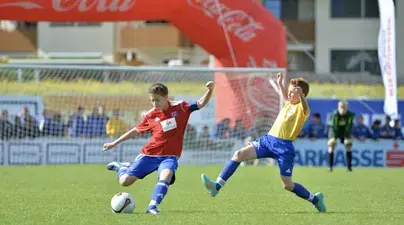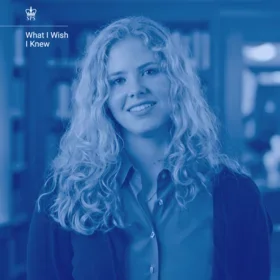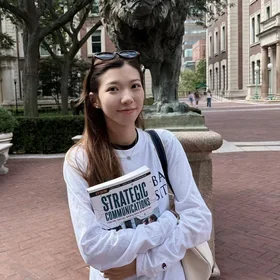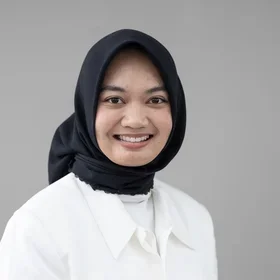Nicolas Leyh is a man of many interests. After playing professional youth soccer in Germany, he paired his undergraduate studies in International Business with a three-year apprenticeship at Airbus. The intensive rotational program exposed him to various business functions and eventually led him to Columbia’s M.S. Technology Management program. “That gave me exposure to the intersection of technology and management, which was intriguing,” he said. During his master’s studies at Columbia, Leyh has interned at the United Nations and cocreated a tech start-up, which he was developing as part of his capstone project. Now he is the executive assistant to the head of cyber, special security programmes, and cross-programme management within connected intelligence at Airbus, Germany.
Earlier this year, he spoke with Columbia SPS News about how Columbia is enhancing his career journey.
Why did you choose the Master’s in Technology Management at Columbia?
After high school, I started working as a corporate student at Airbus. I predominantly worked in the areas of international business, communication, finance, and sales. Eventually, I started working at Airbus Urban Air Mobility, a corporate start-up of Airbus. All those experiences gave me exposure to the intersection of technology and management, which has sparked my interest. The Technology Management program at Columbia is the perfect sweet spot between information technology and its management functions. My interest lies in understanding the applications of technology in businesses. The courses available at Columbia, the teaching methods, the prestigious and experienced faculty, the class diversity, and the location in New York aligned with my goals. Therefore, the program seemed like the perfect fit for me.
How did your fellow students add to your experience?
My cohort is very diverse, not only from a professional but also from a personal perspective. Many classmates are at different stages in their professional career as well as life, and therefore add a lot of value to the discussions within the course of the program. With so much personal and professional diversity, there is always a fresh perspective to learn from. To give some specific examples, we have industry professionals from mining companies to tech giants like Apple to small start-ups. This mix of experiences makes for very valuable classroom discussions. Learning to think from such a holistic and abundant standpoint is a refreshing and crucial professional skill. Finally, the student network we are building through our mutual learning is very beneficial.
Have any of your professors made a big impact on you?
Professor Craig Cuyar—who is also the global chief information officer at Omnicom Group—made a big impact on me. In the course, Operations Management in IT, he connects the lessons and class discussions with his vast , hands-on experiences and knowledge. Having the opportunity to learn from his own experiences is quite amazing and unique in itself. Another professor who stood out is Dr. Norman Jacknis; he is a senior lecturer with the program and teaches several courses, including Leading Disruptive Change in a Digital Economy and Machine Learning & AI for Technology Leaders. Dr. Jacknis has been the director of Cisco’s IBSG Public Sector Group, the CIO and commissioner of Westchester County, New York, and the cochair of Technology and Enterprise Architecture in New York State Government’s CIO Council, among a few other roles. Professor Jacknis has decades of expert knowledge, especially in artificial intelligence but also in so many management functions. He has an answer to any question that one may think of.
How did you land an internship at the United Nations?
I worked with the United Nations’ Department of Management Strategy, Policy, and Compliance. My responsibilities were in the IT and data functions of the operations, mostly working on automating processes for the department. The eight-month internship was a fantastic experience, and I worked with the Career Design Lab to land the role! They had organized a networking event where representatives of corporations and organizations like Coca-Cola and the United Nations were present. During this event, I had a conversation with a UN representative. Shortly after, she reached out with information about several internship opportunities within the organization. I participated in multiple interviews and met other requirements before I landed the internship, and it was worth it! The Career Design Lab was instrumental in helping me get a foot in the door.
How did the capstone project allow you to develop your start-up BoxOrganizer?
I cocreated the technology start-up BoxOrganizer, which is a connected inventory management system that provides a tool for small businesses and individuals to systematically manage their inventory and possessions. With this innovation, we are supporting our current 1,800 active monthly users to find what they are looking for more quickly and more intuitively than ever before!
The capstone project allowed me to combine all of the business and technology knowledge I learned from the different courses in the program and develop an exciting start-up concept including a business plan, financial model, and investor presentation. The final presentation furthermore allowed me to present the BoxOrganizers professional pitch under exam conditions and to face the questions of experts. All those different learnings from class, in combination with individual reflective sessions with the professor and TAs, certainly helped significantly in my developing a strategic and promising business plan for the BoxOrganizer.

Learn more about Columbia’s Technology Management program, or find Career Design Lab resources.


